Key takeaways:
- Start building your audience early by engaging them through newsletters and sneak peeks before the launch.
- Select a strategic launch date, considering factors like seasonality and co-promotions with other authors or events to maximize reach.
- Assemble an enthusiastic launch team to support marketing efforts and create buzz around your book, fostering genuine relationships.
- Utilize diverse marketing channels and maintain consistency on social media to enhance reader engagement and anticipation.
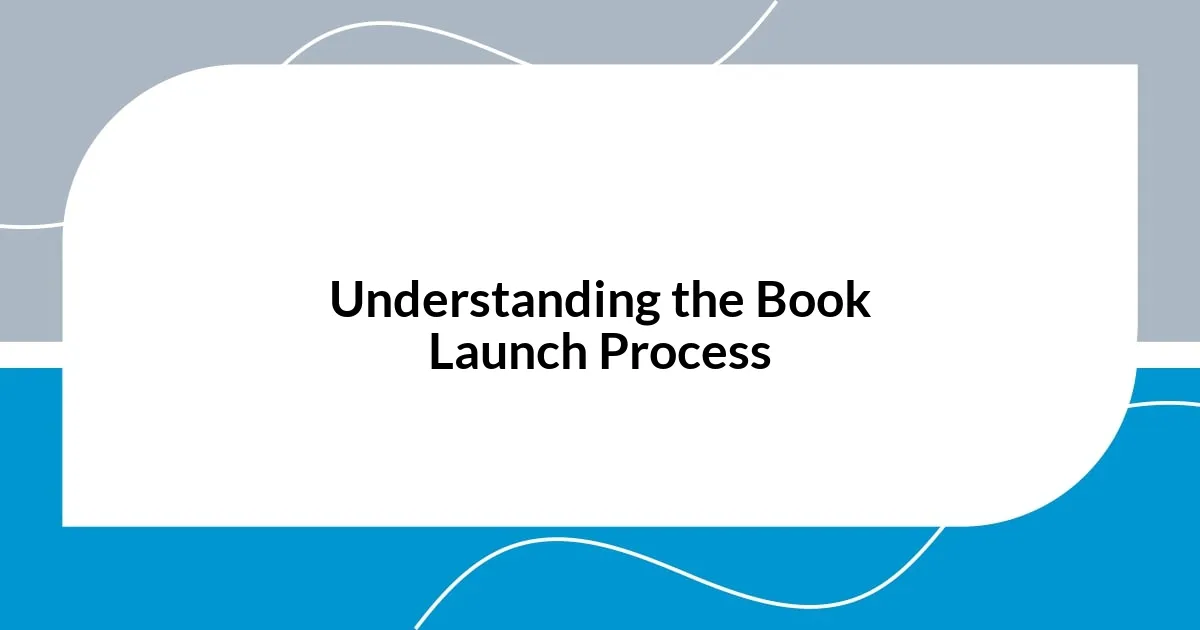
Understanding the Book Launch Process
The book launch process can feel overwhelming, but I’ve learned that understanding its stages can significantly ease that stress. When I launched my first book, I was surprised by how much work goes into preparing for that big day; it’s not just about the writing, but about creating a comprehensive plan that addresses marketing, outreach, and audience engagement. What if I had waited until the last minute? I shudder to think how chaotic it could have been!
One key aspect that often gets overlooked is the importance of building your audience ahead of the launch. I remember setting up a newsletter months before my release and sharing sneak peeks and behind-the-scenes stories. This allowed me to forge a genuine connection with my readers, and when the launch day arrived, I was thrilled to see them eager and ready to support me.
Tracking progress post-launch is another vital component. After my latest book went live, I made it a point to monitor sales and reader feedback. This not only helped me identify what resonated with my audience but also guided my future projects. How else would I know what my readers truly valued? Engaging with them during this phase made me feel more connected and invested in their reading experience.
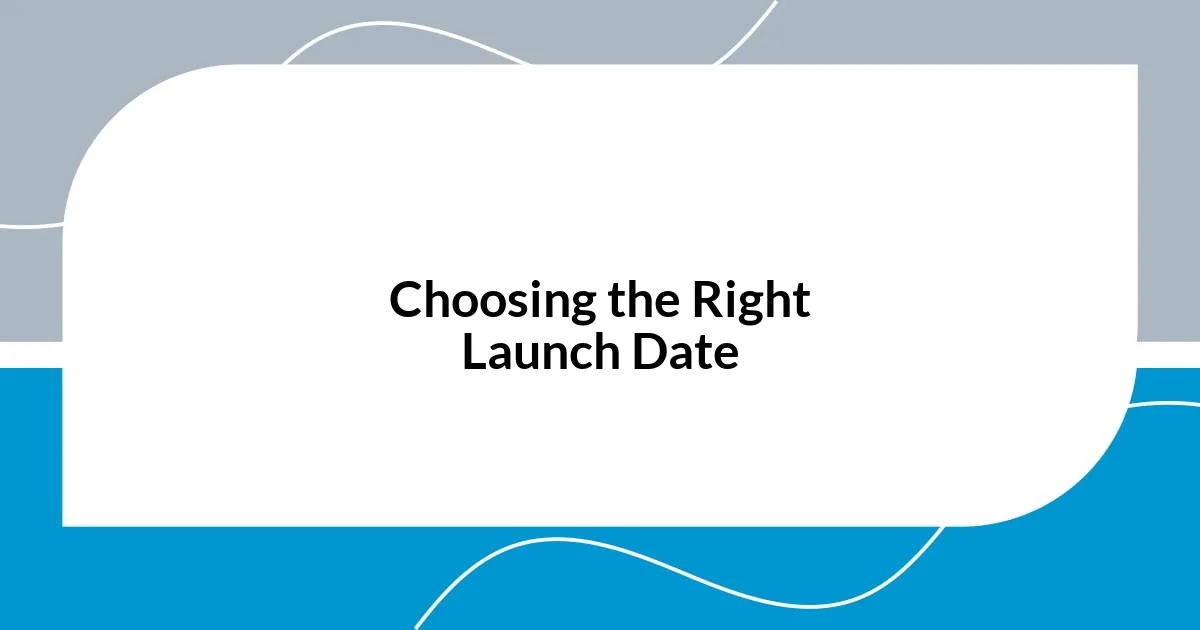
Choosing the Right Launch Date
Choosing the right launch date can make all the difference in your book’s success. I once scheduled my launch for a holiday weekend, thinking it would be a great opportunity to grab attention. Instead, I found that many potential readers were preoccupied with family gatherings and travel. It became clear to me that timing truly affects visibility.
Consider seasonality and current events when selecting your date. When I planned my second book launch in early spring, I noticed more readers were excited to dive into new materials after the winter slump. This change not only increased engagement but also boosted sales, proving that aligning your launch with a favorable time frame can lead to greater enthusiasm from your audience.
Moreover, co-promotions with other authors or events can amplify your reach. I once aligned my launch with a local literary festival, which captivated a larger audience and provided me with an interactive platform. This camaraderie within the author community opened fresh opportunities for collaboration and expanded my reader base in an enjoyable way.
| Considerations | Impact |
|---|---|
| Holiday Weekends | Potentially lower visibility |
| Seasonal Trends | Increased audience engagement |
| Co-promotions | Extended reach and community support |
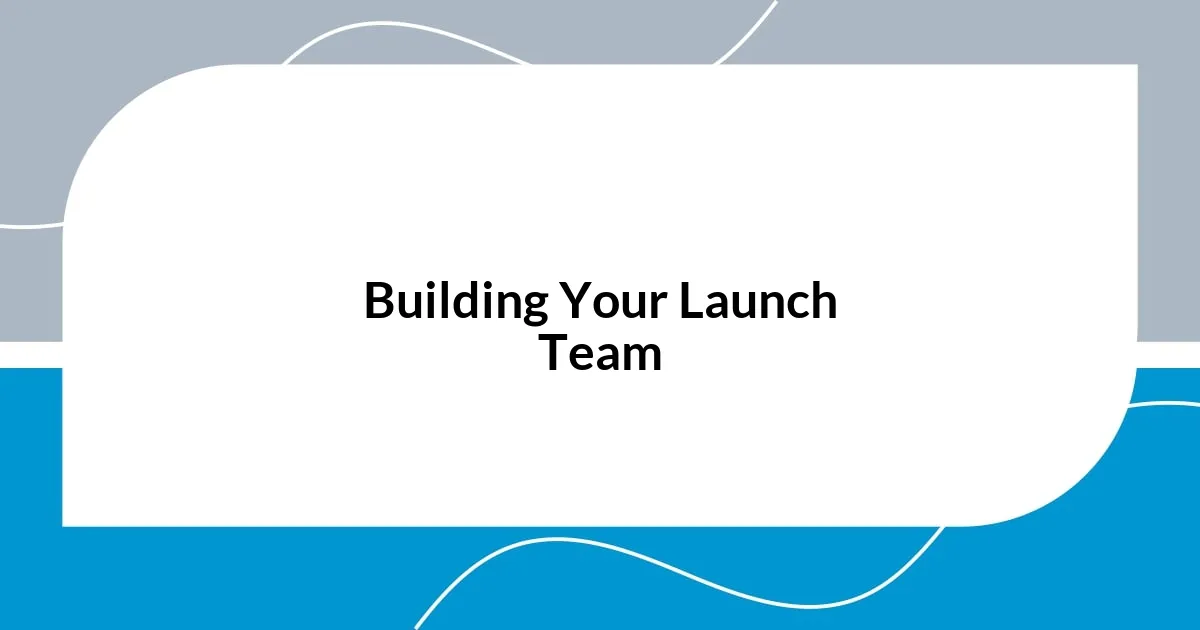
Building Your Launch Team
Building a dedicated launch team is a crucial ingredient for a successful book launch. I vividly recall the excitement (and a pinch of anxiety) when I reached out to friends, fellow authors, and avid readers to form my very first launch team. It felt empowering to gather a supportive group that was genuinely excited about my book. Knowing I had people who were ready to promote my work, share their thoughts, and create buzz made all the difference in calming my nerves as the launch date approached.
When assembling your launch team, focus on engaging individuals who are enthusiastic about your genre and can connect with your message. Here are some meaningful ways to build your team:
- Identify your target audience: Seek out readers who enjoy similar genres to ensure genuine interest.
- Communicate your vision: Share your goals and the story behind your book so your team can passionately represent it.
- Incentivize engagement: Consider offering exclusive content, signed copies, or shout-outs as a thank-you for their efforts.
- Leverage social media: Create a dedicated group on platforms like Facebook to foster community and share updates.
- Encourage feedback: Invite your team to share their thoughts on early drafts or promotional materials to make them feel valued.
Building this community not only enhances your launch strategy but also creates lasting relationships that can support future projects. The friendships I’ve formed through my launch teams have truly enriched my writing journey.
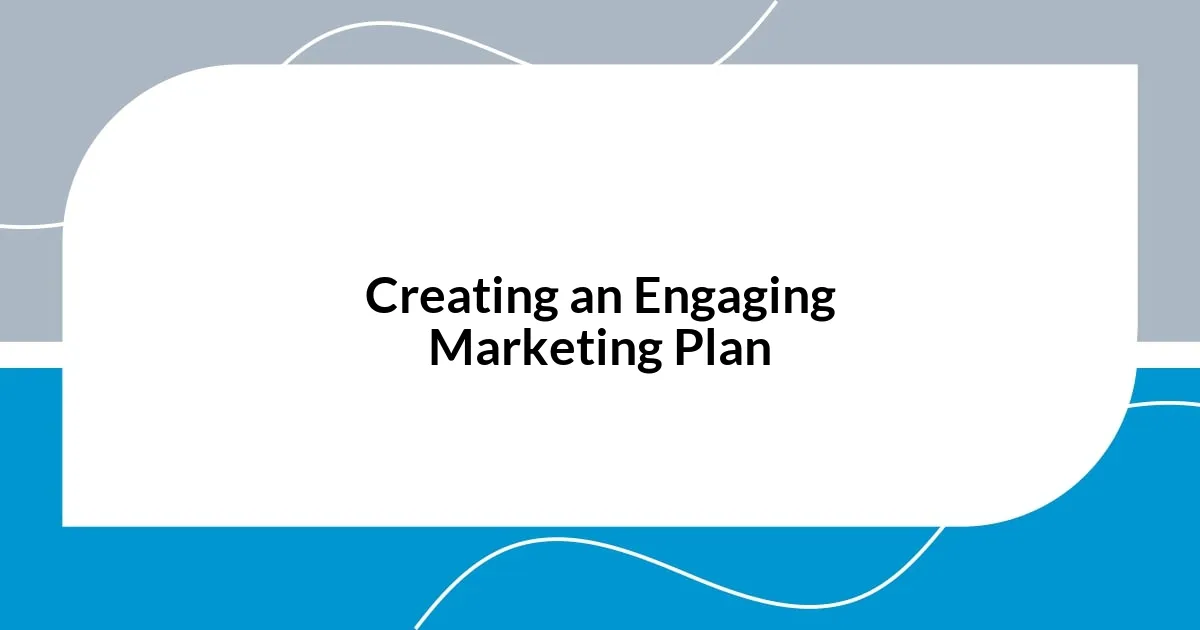
Creating an Engaging Marketing Plan
Creating an engaging marketing plan starts with understanding your target audience deeply. When I prepared for one of my book launches, I took a moment to really visualize who my readers were. What do they like? What challenges do they face? I discovered that connecting with your audience on a personal level not only informs your marketing strategies but also creates authentic engagement—transforming potential readers into passionate advocates.
Next, leveraging the power of storytelling in your marketing materials can make a huge impact. I remember crafting a heartfelt blog post about my writing journey that resonated with many readers; it wasn’t just about the book, but the emotional journey behind it. This connection sparked conversations and curiosity, ultimately generating more interest than a standard promotional pitch ever could. How do you tell your story in a way that captivates and includes your audience?
Lastly, consider diversifying your marketing channels. While social media is a great starting point, I found that combining it with emails, podcasts, and even virtual book events can expand your reach significantly. For my last launch, I hosted a live virtual reading session. The real-time feedback was amazing—readers immediately expressed their enthusiasm and shared their experiences. It’s that moment of interaction that can transform a static marketing plan into a vibrant, engaging experience for your readers. What unique ways can you think of to connect with your audience beyond traditional marketing?
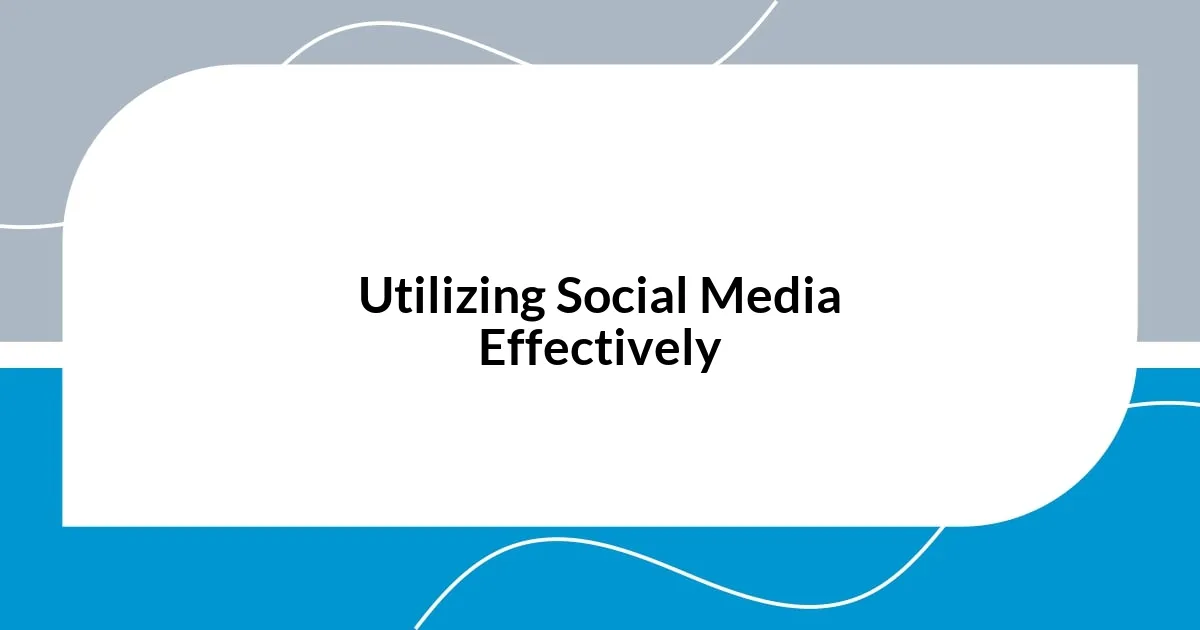
Utilizing Social Media Effectively
Utilizing social media effectively during your book launch can turn the tide in how your book is received. I remember my first launch on Instagram, where I shared behind-the-scenes snippets of my writing process. It felt like inviting my readers into my creative space, and their response was incredible; suddenly, I wasn’t just an author but a storyteller they could relate to. Have you considered how you can use social media to showcase your journey?
Engagement is key. I found that hosting Q&A sessions or live readings created an interactive atmosphere that readers loved. One time, after a live session, a reader reached out to me, sharing how my book mirrored their own experiences. That connection propelled them to rally their friends to check out my book. Isn’t it fascinating how a simple online interaction can transform someone from a passive observer to an active supporter?
Additionally, I learned that consistency is essential. Scheduling regular posts and updates kept my followers excited and anticipating the launch. During my last campaign, I utilized tools like Buffer to plan my content, pairing each post with captivating visuals and thoughtful captions. This strategy not only heightened the anticipation but also gave my audience something to look forward to daily. How can you organize your own social media presence to maintain that momentum?
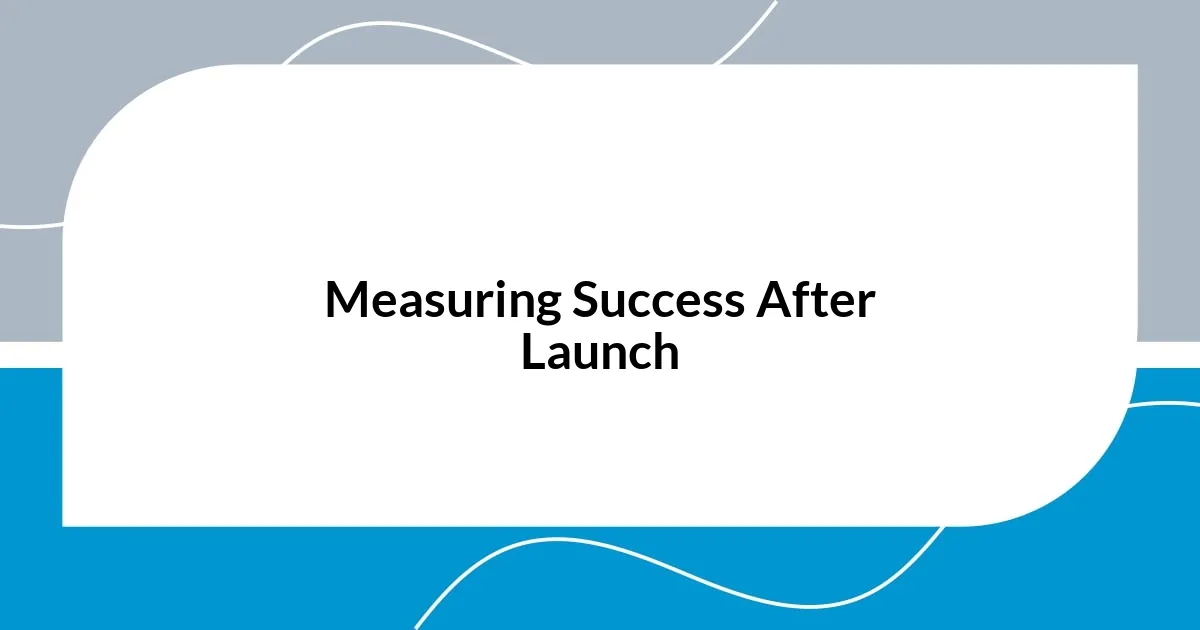
Measuring Success After Launch
Evaluating the success of your book launch goes beyond just tracking sales numbers. For instance, in one of my launches, I focused on gathering reader feedback through surveys. The responses opened my eyes to what readers loved and areas for improvement. Isn’t it interesting how metrics like reader engagement can often tell a more profound story than sales alone?
I’ve come to appreciate the impact of monitoring social media buzz as well. After my last launch, I used tools like Google Alerts and social listening to understand how people were discussing my book online. Seeing readers share their thoughts and photos was exhilarating; it validated the emotional connection my story made. Have you tapped into any online discussions, and how might those insights shape your future projects?
Lastly, I often reflect on my community engagement post-launch. For instance, I established online book clubs where readers could discuss themes from my book, which fostered a sense of belonging. These interactions not only deepened reader relationships but also enhanced my understanding of my audience. What steps can you take to build that sense of community and ongoing dialogue with your readers after your launch?